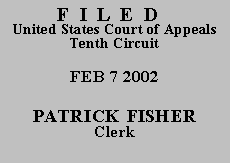

|
FRANCISCO JAVIER CAMPOS, JR., |
|
Before HENRY, BRISCOE, and MURPHY, Circuit Judges.
This case is before the court on a request by Francisco Javier Campos, Jr. for a certificate of appealability ("COA"). Campos seeks a COA so he can appeal the district court's dismissal of his 28 U.S.C. § 2254 petition. See 28 U.S.C. § 2253(c)(1)(A) (providing that no appeal may be taken from the denial of a § 2254 petition unless the petitioner first obtains a COA). Because Campos has not made a substantial showing of the denial of a constitutional right, he is not entitled to a COA and his appeal is dismissed. See id. § 2253(c)(2).
Campos pleaded guilty to three counts of shooting with intent to kill, one count of discharging a firearm with intent to kill, and one count of unauthorized use of a motor vehicle. On September 17, 1992, Campos was sentenced to 128 years' imprisonment. Campos did not file a direct appeal. Campos' § 2254 habeas corpus petition was not filed with the United States District Court for the Western District of Oklahoma until February 22, 2001.
Campos' § 2254 petition was referred to a United States magistrate judge for initial proceedings. See 28 U.S.C. § 636(b)(1)(B). The magistrate judge entered an order to show cause, directing Campos to show cause why his petition should not be dismissed as untimely under 28 U.S.C. § 2244(d). Campos responded to the order to show cause arguing that his petition was timely filed pursuant to 28 U.S.C. § 2241(d)(1)(D). Campos also asserted that the one-year limitations period should be equitably tolled because of extraordinary circumstances and because he is actually innocent of the charges to which he pleaded guilty.
In his Report and Recommendation, the magistrate judge assumed that 28 U.S.C. § 2241(d)(1)(D) applied but concluded that Campos' § 2254 petition should have been filed no later than March 16, 2000. The magistrate judge further concluded that Campos had failed to diligently pursue his federal constitutional claims and had failed to identify any circumstances that would support the equitable tolling of the limitations period. See Miller v. Marr, 141 F.3d 976, 978 (10th Cir. 1998). Accordingly, the magistrate judge recommended that Campos' § 2254 petition be dismissed as time-barred.
Campos filed a timely objection to the Report and Recommendation. Campos did not dispute the calculation of the one-year limitations period pursuant to § 2241(d)(1)(D), but renewed his arguments that the period should be equitably tolled. The district court considered Campos' objections but adopted the Report and Recommendation and dismissed Campos' § 2254 petition as untimely. The court specifically rejected Campos' contention that he had provided sufficient evidence to demonstrate that he is actually innocent.
The analysis employed by the magistrate judge and the district judge to support the conclusion that Campos' § 2254 petition is untimely is thoroughly set forth in the Report and Recommendation and the district court's Order. This court has reviewed Campos' application for a COA, his appellate brief, the district court's Order dated July 30, 2001, the Report and Recommendation dated May 25, 2001, and the entire record on appeal. That review clearly demonstrates the district court's dismissal of Campos' § 2254 petition as untimely is not deserving of further proceedings or subject to a different resolution on appeal. Accordingly, we deny Campos' request for a COA and dismiss his appeal.
ENTERED FOR THE COURT
Michael R. Murphy
Circuit Judge
*. This order and judgment is not binding precedent, except under the doctrines of law of the case, res judicata and collateral estoppel. The court generally disfavors the citation of orders and judgments; nevertheless, an order and judgment may be cited under the terms and conditions of 10th Cir. R. 36.3.